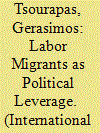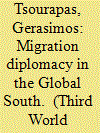|
|
|
Sort Order |
|
|
|
Items / Page
|
|
|
|
|
|
|
| Srl | Item |
| 1 |
ID:
160576


|
|
|
|
|
| Summary/Abstract |
How do states attempt to use their position as destinations for labor migration to influence sending states, and under what conditions do they succeed? I argue that economically driven cross-border mobility generates reciprocal political economy effects on sending and host states. That is, it produces migration interdependence. Host states may leverage their position against a sending state by either deploying strategies of restriction—curbing remittances, strengthening immigration controls, or both—or displacement—forcefully expelling citizens of the sending state. These strategies’ success depends on whether the sending state is vulnerable to the political economy costs incurred by host states’ strategy, namely if it is unable to absorb them domestically and cannot procure the support of alternative host states. I also contend that displacement strategies involve higher costs than restriction efforts and are therefore more likely to succeed. I demonstrate my claims through a least-likely, two-case study design of Libyan and Jordanian coercive migration diplomacy against Egypt in the aftermath of the Arab Spring. I examine how two weaker Arab states leveraged their position against Egypt, a stronger state but one vulnerable to migration interdependence, through the restriction and displacement of Egyptian migrants.
|
|
|
|
|
|
|
|
|
|
|
|
|
|
|
|
| 2 |
ID:
154796


|
|
|
|
|
| Summary/Abstract |
Despite a recent resurgence in research on the politics of migration, foreign policy analysts have yet to approach cross-border population mobility as a distinct field of inquiry. Particularly within the Global South, scant work has theorised the interplay between migration and interstate bargaining. This article proposes the framework of migration diplomacy to examine how mobility features in states’ issue-linkage strategies, in both cooperative and coercive contexts. Drawing on Arabic, French and English primary sources, it empirically demonstrates the salience of its framework through an analysis of Libya’s migration diplomacy towards its Arab, African and European neighbours under Muammar Gaddafi.
|
|
|
|
|
|
|
|
|
|
|
|
|
|
|
|
| 3 |
ID:
168796


|
|
|
|
|
| Summary/Abstract |
How does forced migration affect the politics of host states and, in particular, how does it impact states’ foreign policy decision-making? The relevant literature on refugee politics has yet to fully explore how forced migration affects host states’ behavior. One possibility is that they will employ their position in order to extract revenue from other state or nonstate actors for maintaining refugee groups within their borders. This article explores the workings of these refugee rentier states, namely states seeking to leverage their position as host states of displaced communities for material gain. It focuses on the Syrian refugee crisis, examining the foreign policy responses of three major host states—Jordan, Lebanon, and Turkey. While all three engaged in post-2011 refugee rent-seeking behavior, Jordan and Lebanon deployed a back-scratching strategy based on bargains, while Turkey deployed a blackmailing strategy based on threats. Drawing upon primary sources in English and Arabic, the article inductively examines the choice of strategy and argues that it depended on the size of the host state's refugee community and domestic elites’ perception of their geostrategic importance vis-à-vis the target. The article concludes with a discussion of these findings’ significance for understanding the international dimension of the Syrian refugee crisis and argues that they also pave the way for future research on the effects of forced displacement on host states’ political development.
|
|
|
|
|
|
|
|
|
|
|
|
|
|
|
|
|
|
|
|
|